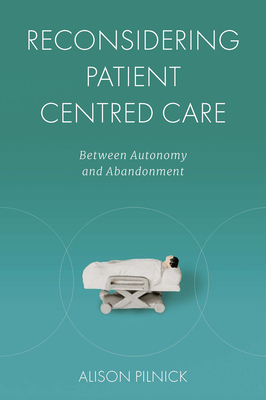Reconsidering Patient Centred Care: Between Autonomy and Abandonment

Reconsidering Patient Centred Care: Between Autonomy and Abandonment
In a major contribution to the sociology of medicine, Alison Pilnick shifts the terms of the debate around patient centred care (PCC). PCC is typically framed as a moral imperative, necessary to prevent a return to the outmoded medical paternalism of the past. However, empirical research repeatedly fails to show a clear link between the adoption of PCC and improvement in health outcomes. These results are largely considered as professional failings, to be remediated through 'better' training in PCC; as a result empirical research is largely focused on the extent to which practice does not live up to checklists of PCC criteria.
Through the detailed examination of a large corpus of healthcare interactions collected from a range of settings over a 25 year period, Pilnick illustrates the ways in which there are good organisational and interactional reasons for what may look from a PCC perspective like 'bad' healthcare practice. Conceptualisations of PCC typically foreground the importance of patient autonomy, to be exercised through choice and control; the analysis presented here highlights the problems with these consumerist underpinnings of PCC, and shows how the interactional consequence of attempting to enact them is often the sidelining of medical expertise that patients want or need.
Arguing that reform would be better directed at considering how this expertise can be re-centred in contemporary healthcare, the analysis illustrates why values-driven policy can be problematic in practice, and points to the importance of using analyses of healthcare interaction to inform healthcare policy making from the outset, rather than simply as a barometer of its success.
PRP: 662.30 Lei
Acesta este Prețul Recomandat de Producător. Prețul de vânzare al produsului este afișat mai jos.
529.84Lei
529.84Lei
662.30 LeiLivrare in 2-4 saptamani
Descrierea produsului
In a major contribution to the sociology of medicine, Alison Pilnick shifts the terms of the debate around patient centred care (PCC). PCC is typically framed as a moral imperative, necessary to prevent a return to the outmoded medical paternalism of the past. However, empirical research repeatedly fails to show a clear link between the adoption of PCC and improvement in health outcomes. These results are largely considered as professional failings, to be remediated through 'better' training in PCC; as a result empirical research is largely focused on the extent to which practice does not live up to checklists of PCC criteria.
Through the detailed examination of a large corpus of healthcare interactions collected from a range of settings over a 25 year period, Pilnick illustrates the ways in which there are good organisational and interactional reasons for what may look from a PCC perspective like 'bad' healthcare practice. Conceptualisations of PCC typically foreground the importance of patient autonomy, to be exercised through choice and control; the analysis presented here highlights the problems with these consumerist underpinnings of PCC, and shows how the interactional consequence of attempting to enact them is often the sidelining of medical expertise that patients want or need.
Arguing that reform would be better directed at considering how this expertise can be re-centred in contemporary healthcare, the analysis illustrates why values-driven policy can be problematic in practice, and points to the importance of using analyses of healthcare interaction to inform healthcare policy making from the outset, rather than simply as a barometer of its success.
Detaliile produsului









